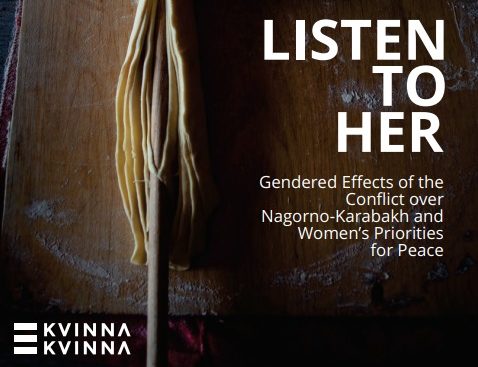The description of this project has been provided by Kvinna Till Kvinna.
About the project
Kvinna till Kvinna and their partners provided safe spaces for dialogue among women organizations, both within and across communities. These took place at both national and regional levels. This initiative focused on creating safe spaces for women’s dialogue, both within and across communities. The main aims for the project were:
- to promote dialogue and discussion that would help change the way the Armenian-Azerbaijani conflict was discussed, both at grass roots and policy levels; and
- to contribute to building an inclusive civil society in the region with strong capacity and motivation for peacebuilding.
The initiative took place before the 2020 war and was funded by the EU’s EPNK3 programme. Later it was substituted with another project aimed at supporting women experts in peace building and human rights fields.
From dialogue to action
The dialogue meetings brought together a range of women’s organisations to exchange experiences and share information about the communities they serve, their local projects and initiatives and the lessons they had learned from these.
This resulted in more understanding among the groups of conflict dynamics and conflict transformation, and a steady increase in motivation for dialogue across the conflict divide. The dialogue improved confidence in ‘the other side’ as well as mutual understanding of the conflict, its sensitivities and the consequences for women on the different sides. The discussions also led to deeper cooperation among the participants. .
This led to two specific outcomes:
- sharing a methodology on collecting and documenting oral stories with a feminist approach. This fed into Listen To Her, a report on the gendered effects of the conflict over Nagorny Karabakh; and
- a “Memorandum of Trust”, which included mutual agreement on the toponyms to be used when discussing the conflict over Nagorno-Karabakh, and other issues aimed at sustainable and secure communication.
Peacebuilding
Local partners implemented a series of six mentoring projects and peacebuilding activities. These targeted mainly at communities affected by conflict, but also included the general public and civil society organisations. The events reached over 1,400 people, mostly women and girls.
The programmes attracted participants of different ages, levels of education, and diverse backgrounds.
- In Armenia and Azerbaijan, almost half of participants were women from rural areas, the rest – from urban communities;
- In Armenia and Nagorny Karabakh, around 10% of participants were men;
- In Nagorny Karabakh, almost a half of participants were under the age of 30.
These projects helped empower local communities to engage in peacebuilding activities and to discuss conflict transformation. Some included capacity and skill-building training, with a small grants programme for participants to implement their own sustainable and independent initiatives. This allowed them to respond to the specific needs of their communities, for example providing employment skills for young women.
Kvinna till Kvinna’s partners on the ground have continued to engage new people in their peacebuilding activities.
Photograph by Gulnar Salimova

